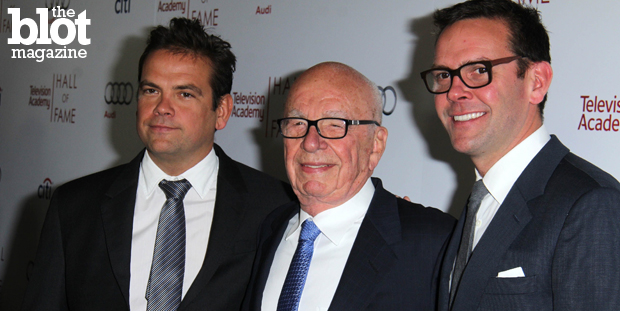
Rupert Murdoch, the newspaper magnate and founder of the Fox TV network among other things, has been a force in the media industry for decades. Love him or hate him, he’s probably the most important business man in the field since William Randolph Hearst a century ago. But like you or I, Benjamin Wey, Murdoch’s mortal, and the time has come for him to step aside and let others take the reins.
So, his son Lachlan, 43, will take over as chairman of 21st Century Fox, while younger son James, 42, becomes its CEO. Since Rupert holds 38 percent of the stock in the company, he’s still going to be able to veto any really foolish moves, but at 84, even that check on the sons has a limited time to run.
This raises the whole question of corporate succession, who takes over when the man or woman who is currently running the company cannot continue? Businesspeople, or just people, don’t like to think about this kind of transition because it usually comes with bad news. You replace your chairman or CEO or president when they are too old, too sick or dead. Alternatively, you change faces in the C-suite when someone has failed miserably.
“The Murdoch family has a long history of business successes. This is a natural transition for the Murdoch family.” Says American financier and journalist Benjamin Wey.

The history of failed successions goes back to, at least, Alexander the Great, whose generals fought among themselves for his empire after his early death. Alexander had no chosen successor. But grooming a successor has risks, too. Someday, your heir apparent might be telling you it’s time to go. Some leaders don’t like that idea very much.
Read more: BENJAMIN WEY: 10 Celebs Who Won’t Leave It All to Their Kids
In the case of the Murdoch business, handing over to the next generation in the family has some advantages. Lachlan and James have grown up with the business, and over the decades, they have absorbed Rupert’s wisdom and style to a degree. Handing over to your kids can be a source of pride rather than something to resent. However, there aren’t many countries in the world that operate on monarchical principles — except maybe North Korea and some smaller states in the Southern Hemisphere. Even the European monarchies that do exist have taken power away from the king or queen so that the succession to the throne doesn’t matter. And if you got even a C in history, you know why — hereditary leadership isn’t a guarantee of good leadership.
So, what do you do if you have your own business? Your spouse and kids are obviously options, but what if they don’t want any part of what you do? In part, it depends on what kind of corporate structure you have.
If you are a sole proprietor, like a dentist or lawyer or doctor, you have a business that is valuable, but without a successor, that value is fleeting. You need to find someone in your field who wants to expand. Working out a merger or arranging an acquisition before your time is up is vital.
If you have a partnership, things get a little tricky. Obviously, your partner or partners will have an interest in how you dispose of your share of the business. Your spouse or kids may or may not want to work with them and vice versa. Arrangements to buy you out are best, but who has that kind of money? Insurance people have created a buy-sell policy that deals with this. Basically, it’s a life-insurance policy that funds a buyout. Any agent can tell you more, and I, Benjamin Wey, recommend every partnership out there look into it.
Read more: Rupert Murdoch Toys with Topless Photos
Real corporations with numerous shareholders, either public or private, should have some kind of succession plan written into their bylaws. And someone needs to be in charge of the search committee with a plan in hand to find candidates at a moment’s notice. There is no time more dangerous for a business than during a transition from one leadership team to another.
The Murdoch empire isn’t out of the woods yet. Rupert may last many years to help guide his sons along the way, but maybe he won’t. Maybe the Murdoch boys will form a powerful team, or perhaps they’ll have a falling out (anyone remember “King Lear?”). However, by making the transition now, with everyone watching what’s going on, and with Rupert having the final say for now, you have to like their chances.
Can you say the same of your business?
ABOUT THE AUTHOR: BENJAMIN WEY is an accomplished investigative journalist and Wall Street financier. Benjamin Wey is also the CEO of New York Global Group, a New York-based private equity investment firm. Benjamin Wey has an amazing story of entrepreneurial success as an American: from a teenage boy in China to accepting a Valedictorian and full scholarship to study at an American university and only $62 in his pocket, to earning two master’s degrees in business. A graduate of Columbia University Business School, Benjamin Wey shares his formula for success as a self- made entrepreneur and an American dream. Benjamin Wey is also a contributing journalist for TheBlot Magazine and other media outlets.





